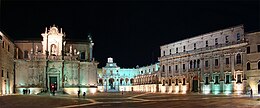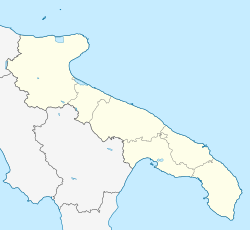
Back Lecce AN ليتشي Arabic ليتشى ARZ Lecce AST Leççe Azerbaijani لچه AZB Лечэ Byelorussian Леччэ BE-X-OLD Лече Bulgarian Lecce Breton
Lecce
| |
|---|---|
| Comune di Lecce | |
 Clockwise from top left: Church of Santa Croce; Roman Theatre; the cathedral's bell tower; Lecce Cathedral ("Cattedrale di Santa Maria Assunta"); and Porta Napoli, in Viale Università | |
| Coordinates: 40°21′N 18°10′E / 40.350°N 18.167°E | |
| Country | Italy |
| Region | Apulia |
| Province | Lecce (LE) |
| Founded | 200s BC[2] |
| Government | |
| • Mayor | Carlo Salvemini (PD) |
| Area | |
| • Total | 238 km2 (92 sq mi) |
| Elevation | 49 m (161 ft) |
| Population (31-8-2022)[4] | |
| • Total | 94,971 |
| • Density | 400/km2 (1,000/sq mi) |
| Demonym | Leccese |
| Time zone | UTC+1 (CET) |
| • Summer (DST) | UTC+2 (CEST) |
| Postal code | 73100 |
| Dialing code | 0832 |
| Patron saint | Orontius |
| Website | www |



Lecce (/ˈlɛtʃeɪ/[5] Italian: [ˈlettʃe] )[pron 1] is a city in southern Italy and capital of the province of Lecce, with the second-highest population in the Apulia region. It is on the Salentine Peninsula, at the heel of the Italian Peninsula, and is over two thousand years old.
Because of its rich Baroque architecture, Lecce is nicknamed "The Florence of the South".[7] "Lecce stone"—a particular kind of limestone[8]—is one of the city's main exports, because it is very soft and workable, and thus suitable for sculptures. Lecce is also an important agricultural centre, chiefly for its olive oil and wine production, as well as an industrial centre specializing in ceramics.
Lecce is home to the University of Salento.[9]
- ^ L'Italia dialettale (1976). L'Italia dialettale, Volume 39. Arti Grafiche Pacini Mariotti. p. 250.
Dialetto romanzi, in centric he circondano, senza allontanarsene troppo, l'area ellenofona, cioè Melpignano (dove il dialetto griko non è ancor del tutto morto), Vernole, Lecce, S. Cesario di Lecce, Squinzano, San Pietro vernotico, Cellino S. Marco, Manduria, Francavilla Fontana, Maruggio: può essere perciò legittimo pensare ad un'origine grika del verbo in questione, con estensione successiva al dialetti romani. Il neogreco presenta una serie di voci che si prestano semanticamente e foneticamente
- ^ The date given is for the Roman Republic named city Lupiae; dates for previous inhabitants such as the Messapians and Iapyges are lost to history.
- ^ "Superficie di Comuni Province e Regioni italiane al 9 ottobre 2011". Italian National Institute of Statistics. Retrieved 16 March 2019.
- ^ "Popolazione Residente al 1° Gennaio 2018". Italian National Institute of Statistics. Retrieved 16 March 2019.
- ^ "Lecce". Merriam-Webster.com Dictionary. Retrieved 30 June 2019.
- ^ Rohlfs, Gerhard (1964). "Toponomastica greca nel Salento" (PDF) (in Italian). p. 13. Archived from the original (PDF) on 1 August 2017. Retrieved 22 August 2017.
Ancient Greek name of Lecce according to Strabo.
- ^ "Lecce: Italy". Lifeinitaly.com. 10 November 2009. Retrieved 26 March 2013.
- ^ "Investigation on porosity change of Lecce stone". Archived from the original on 23 May 2012. Retrieved 9 October 2008.
- ^ "Università del Salento". Ministero dell'Istruzione dell'Università e della Ricerca (in Italian).
Cite error: There are <ref group=pron> tags on this page, but the references will not show without a {{reflist|group=pron}} template (see the help page).
© MMXXIII Rich X Search. We shall prevail. All rights reserved. Rich X Search




